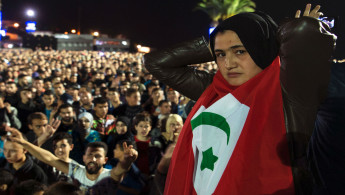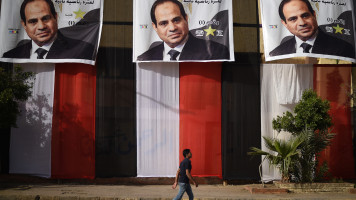Moroccans continue protests demanding justice for fish seller
The anger is palatable in Hoceima, a Moroccan port on the Mediterranean Sea. It has ignited protests across the country and threatens to cloud Morocco's image as it prepares to host two weeks of high-profile UN climate talks.
Tens of thousands of people marched in a silent candlelight vigil Friday night by the local police station where fish vendor Mouhcine Fikri died in a garbage compactor.
Fikri had been selling 500 kilograms of unauthorized swordfish that police confiscated and discarded. He then climbed into a garbage truck to retrieve the fish, and was crushed when its compactor was activated.
Local media have reported that police allegedly told the driver to "grind him" although the prosecutor issued a statement saying "no specific order was given to kill" Fikri.
The rallying cry for the protests has been "hogra," or the deprivation of dignity, reflecting deep frustration among Moroccans at impunity and corruption among police and officialdom.
Some have compared Fikri's death to the death of Tunisian vendor Mohamed Bouazizi, which sparked the Arab Spring uprisings across North Africa.
Experts say Fikri's death is unlikely to lead to a revolution in Morocco, but it is putting pressure on Moroccan leadership.
The king himself has intervened to ensure a thorough investigation, and the government has been unusually communicative about the case, trying to quell an outpouring of anger on social media.
 |
I will ask for those responsible to be punished. I will not let him down - Imad Fikri |
 |
More protests are planned for Sunday - just as world diplomats gather in Marrakech for the UN climate talks starting Monday to follow up on the landmark Paris Agreement to slow global warming.
Since Fikri's death on October 28, protests have taken place around Morocco and at the Moroccan embassies in Brussels and Paris. Tunisians held a solidarity protest as well.
On Tuesday, the Ministry of Interior announced that 11 people would face charges for manslaughter and forgery, including two local security agents and the head of the local fisheries department. But questions remain about what exactly happened.
"So far, the inquiry did not show who exactly activated the machine," says one of Mouhcine's older brothers, Imad Fikri, in the family's hometown of Imzouren, near Hoceima.
"I will ask for those responsible to be punished. I will not let him down."
Another brother, Wael, prayed at Mouhcine's grave, while friends came to offer condolences to the distraught family.
 |
According to people who knew Fikri, this was not his first confrontation with police over his merchandise |  |
Organizers of Friday's demonstration in Hoceima said they don't have faith in the Interior Ministry to conduct a fair investigation.
But they took pains to avoid violence, remaining calm and forming a ring around the police station to prevent attacks on police.
Protesters gathered in Mohammed VI Square, chanting "Mouhcine's death was a murder!" and waving the tri-color Amazigh flag and the flag of the former Rif Republic, in a reminder of this region's history of resistance to outside control.
"We came to protest the horrific death of Mouhcine and to express our anger against all those involved," said Nezha Ismaili, 24.
The death has hit residents hard in Hoceima, a small, mountainous port where fishing is a key industry.
According to people who knew Fikri, this was not his first confrontation with police over his merchandise.
"He was hard-working and it was not the first time they confiscated a quantity of fish belonging to him," says fish trader Hicham Khaldi.
The protests come at an awkward time politically for Morocco, as the prime minister is struggling to form a coalition government after a tense election campaign.
Intissar Fakir at the Carnegie Endowment for International Peace does not think these protests will lead to a "revolutionary moment" but could still affect change in the North African nation.
"Perhaps this will be the beginning of a realization that this entrenched culture of lack of accountability, and the disdain and disregard for citizens needs to change," she said.



